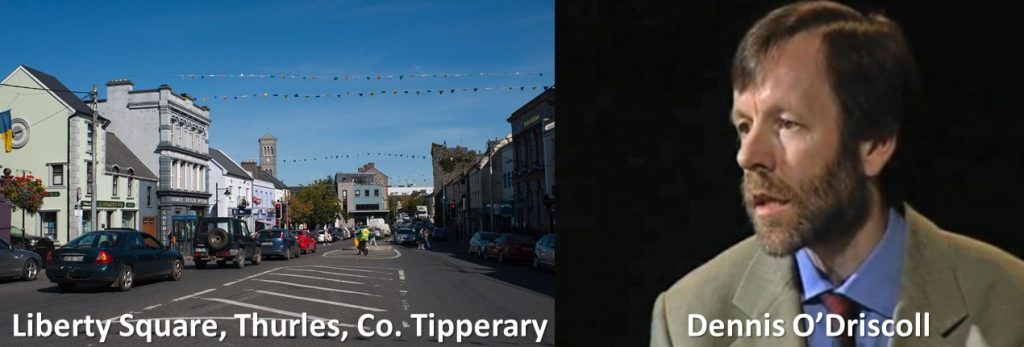
‘Missing God’ is a very moving poem by Dennis O’Driscoll. I’m going to quote it in full and then I’ll link it with a recent very surprising statement by Richard Dawkins, the well-known evangelist for atheism.
It was in a book by an Englishman who has made his home in Scotland that I first came across this poem. It was by an Irishman of whom I had never heard even though he was from Thurles which is less than twenty five miles from where I was brought up. (The book was David Smith’s Moving Towards Emmaus.) O’Driscoll was a friend of Seamus Heaney and one of his books is a set of interviews with Heaney entitled Stepping Stones. (You can see and hear them in conversation here.) Following O’Driscoll’s sudden death in 2012, Heaney entitled a tribute to him ‘My Hero: Dennis O’Driscoll’.
Here is the poem, Missing God:
His
grace is no longer called for
before meals: farmed fish multiply
without His intercession.
Bread production rises through
disease-resistant grains devised
scientifically to mitigate His faults.
Yet,
though we rebelled against Him
like adolescents, uplifted to see
an oppressive father banished –
a bearded hermit – to the desert,
we confess to missing Him at times.
Miss
Him during the civil wedding
when, at the blossomy altar
of the registrar’s desk, we wait in vain
to be fed a line containing words
like “everlasting” and “divine”.
Miss
Him when the TV scientist
explains the cosmos through equations,
leaving our planet to revolve on its axis
aimlessly, a wheel skidding in snow.
Miss
Him when the radio catches a snatch
of plainchant from some echoey priory;
when the gospel choir raises its collective voice
to ask Shall We Gather at the River?
or the forces of the oratorio converge
on I Know That My Redeemer Liveth
and our contracted hearts lose a beat.
Miss
Him when a choked voice
at the crematorium recites the poem
about fearing no more the heat of the sun.
Miss
Him when we stand in judgment
on a lank Crucifixion in an art museum,
its stripe-like ribs testifying to rank.
Miss
Him when the gamma-rays
recorded on the satellite graph
seem arranged into a celestial score,
the music of the spheres,
the Ave Verum Corpus of the observatory lab.
Miss
Him when we stumble on the breast lump
for the first time and an involuntary prayer
escapes our lips; when a shadow crosses
our bodies on an x-ray screen; when we receive
a transfusion of foaming blood
sacrificed anonymously to save life.
Miss
Him when we call out His name
spontaneously in awe or anger
as a woman in the birth ward bawls
her long-dead mother’s name.
Miss
Him when the linen-covered
dining table holds warm bread rolls,
shiny glasses of red wine.
Miss
Him when a dove swoops
from the orange grove in a tourist village
just as the monastery bell begins to take its toll.
Miss
Him when our journey leads us under
leaves of Gothic tracery, an arch
of overlapping branches that meet
like hands in Michelangelo’s creation.
Miss
Him when, trudging past a church,
we catch a residual blast of incense,
a perfume on par with the fresh-baked loaf
which Milosz compared to happiness.
Miss
Him when our newly-decorated kitchen
comes in Shaker-style and we order
a matching set of Mother Ann Lee chairs.
Miss
Him when we listen to the prophecy
of astronomers that the visible galaxies
will recede as the universe expands.
Miss
Him the way an uncoupled glider
riding the evening thermals misses its tug.
Miss
Him, as the lovers shrugging
shoulders outside the cheap hotel
ponder what their next move should be.
Even
feel nostalgic, odd days,
for His Second Coming,
like standing in the brick
dome of a dovecote
after the birds have flown.
In his book, after quoting this poem, David Smith writes, “Here, surely, is the authentic language of the Emmaus road experience, of those who tread a path from which God has gone missing, and yet confess that as the sky darkens and the air grows cold, they are missing God” (p. 29).
Richard Dawkins was recently reported as saying he feared that if religion were abolished it would “give people a licence to do really bad things”. He said that security camera surveillance of customers in shops did appear to deter shoplifting, adding that people might feel free to do wrong without a “divine spy camera in the sky reading their every thought”. He went on, “People may feel free to do bad things because they feel God is no longer watching them”.[1]
By the entrance to our local Morrisons store there is a life-sized picture of a policeman looking at you and smiling, albeit with handcuffs visible hanging by his side. It certainly makes one feel that one is being watched!
The policeman has a friendly and welcoming smile. I think the God of Dennis O’Driscoll’s poem has a welcoming smile but the god of Richard Dawkin’s writings doesn’t. In a book of over 400 pages, The God Delusion, Dawkins devotes just three to the subject of love (pp. 184-186). Yes, there is a lot of evil and suffering in our world (and, as Dawkins frequently points out, people who profess to believe in God have contributed and do contribute their share to it!) but isn’t it amazing that we can also find love everywhere and often in the most surprising places? Is there any other possible source of it all but the God and Father of Jesus Christ?
Jesus cried from the cross with what Dennis O’Driscoll calls “stripe-like ribs” saying, “Father, forgive them”. Risen from the grave, he stands with open arms and a welcoming smile saying, ““Are you tired? Worn out? Burned out on religion? Come to me. Get away with me and you’ll recover your life. I’ll show you how to take a real rest.” (Matthew 11:28, The Message)
Gracious loving Father, God who is love, please forgive us when so often we go off on our own and you go missing from our lives. May those who are missing you find you and your love in us. Amen.
P.S. If you would like to be
notified when new blogs are posted, please email me through the contact address
on this website or message me if you have come here via a link posted on
Facebook.
[1] ‘Ending religion is a bad idea, says Richard Dawkins’, The Times, 5 October 2019.
